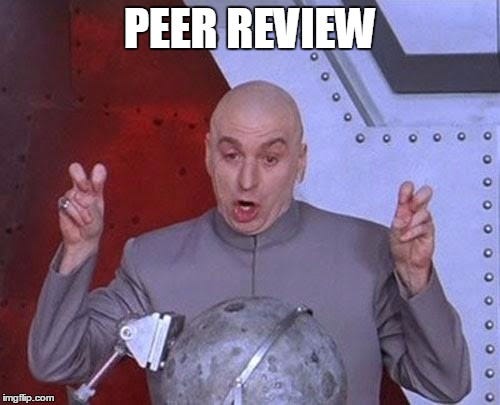Procrustes - Patron Saint of Scientism
Peer review fraud and the reproducibility crisis
Procrustes was a mythical robber from Attica in ancient Greece. His name literally means “the stretcher.” He would lure unsuspecting travelers into his inn with the promise of a comfortable bed that perfectly fit each guest. However, once the guests lay down, Procrustes would either stretch them on a rack or chop off their legs to make them conform to the length of the bed. This gruesome practice has given rise to the term “Procrustean bed,” which refers to the ruthless imposition of uniformity or conformity by violent or arbitrary means.
Procrustes continued this cruel practice until he encountered the hero Theseus, who forced Procrustes onto his own bed and chopped off his head and feet, providing a fitting taste of his own medicine.
The myth of Procrustes serves as a powerful metaphor for the dangers of enforcing strict conformity and the suppression of individuality. In modern contexts, Procrustean treatment can manifest in various forms, such as rigid social norms, inflexible policies, academic dogmas, or oppressive ideologies that seek to mold people into a predetermined standard, often at great cost to personal freedom, diversity and intelligent human progress. By examining the perils of Procrustean thinking, we gain valuable insights into the importance being open while honestly assessing new information.
The modern cult of pseudo-skeptics, maintaining their “appeal to authority” approach to any paradigm-shifting information, are in effect acolytes of Saint Procrustes. For knowledge to progress, academica must resist the temptation to impose arbitrary standards on others.
Peer review, the apparently-sanctified process by which experts in a field are obliged to evaluate the quality and significance of research before publication, is intended to serve as a gatekeeper for scientific integrity. In theory, this process should weed out flawed or fraudulent studies, while helping to refine and improve legitimate research. However, in practice, peer review has far too often devolved into a form of Procrustean treatment, enforcing conformity to established dogmas and stifling innovative or unconventional ideas.
Like Procrustes, who forced his victims to fit his bed by stretching or cutting them, peer reviewers consciously or unconsciously pressure authors to conform to prevailing paradigms, methodologies, or interpretations. Studies that challenge dominant theories or propose novel approaches always face greater obstacles in the peer review process, as reviewers are more inclined to reject or demand extensive revisions to such work. This creates a publication bias that favors incremental, “safe” or “orthodox” research over bold, potentially groundbreaking ideas. Moreover, the anonymity of peer review provides cover for reviewers to engage in gatekeeping and abuse of their position to settle scores or suppress competing views. While it would be nice to think that the vast majority of peer reviewers strive to be fair and objective, the system itself has an homogenizing effect, making it harder for truly original research to see the light of day, thus preserving the “appeal to authority” fallacy as a general rule of operation.
The Procrustean tendencies of peer review are exacerbated by the increasing commercialization and competitiveness of academic publishing. With careers and funding hinging on publication in prestigious journals, researchers face immense pressure to tailor their work to fit the perceived preferences of editors and reviewers. This summarily leads to a narrowing of research agendas and a reluctance to pursue risky or unconventional lines of inquiry. Moreover, the proliferation of predatory publishers and “paper mills” that churn out fraudulent or low-quality research further undermines the integrity of the peer review process. While initiatives like the retraction of over 10,000 papers in 2023 aim to combat these abuses, they also highlight the scale of the problem and the challenges of relying on peer review alone to ensure the quality of scientific output.
Victim of the Procrustean Treatment
There are certainly brilliant papers being published. I peruse new papers regularly and am thankful for the wide plethora of innovations in research in certain areas. However, there are vast areas of endeavour that are not covered by peer review. Halton Arp’s struggles to get his astronomical papers published are an outstanding case.
If Arp’s thesis is correct, then there is no expanding universe, and the accepted layout in space of galaxies and quasars is completely wrong, thus igniting a complete rethink of the universe and our place in it. But theoretical astrophysics is the new cosmological religion. Arp, promoting heretical discoveries, definitely got the full Procrustean treatment. This was a tragedy on many levels, from the thwarting of a visionary genius to the erroneous conceptions of the modern universal paradigm upheld as reigning dogma.
Replication Crisis
The replication crisis in science refers to the growing fact that many published research findings cannot be replicated when the experiments are repeated, casting doubt on the reliability and validity of scientific claims. This crisis is closely related to issues of peer review fraud and the increasing pressure on researchers to publish novel, positive results in high-impact journals.
More than 70% of researchers have tried and failed to reproduce another scientist’s experiments, and more than half have failed to reproduce their own experiments. Those are some of the telling figures that emerged from Nature's survey of 1,576 researchers who took a brief online questionnaire on reproducibility in research.
—Baker, M. 1,500 scientists lift the lid on reproducibility.
Nature 533, 452–454 (2016). https://doi.org/10.1038/533452a
The replication crisis proves that peer review is not effective in identifying flawed or fraudulent research. In some cases, reviewers may be complicit in fraud, accepting bribes or engaging in quid pro quo arrangements to approve dubious papers. Even when fraud is not involved, the peer review process actively reinforces publication bias, favoring studies with positive, statistically significant results over those with negative or inconclusive findings. This means that the published literature does not accurately represent the totality of scientific evidence, leading to inflated estimates of effect sizes and the proliferation of false positives.
The replication crisis requires more than simple reforms to the peer review system, it is just one of the dysfunctional symptoms of a scientism masquerading as science. A new paradigm must emerge that takes life and consciousness into consideration, and where old-paradigm-shattering ideas are honestly reviewed.
When children grow up dreaming of becoming scientists they have the purest of aspirations and if they were left to pursue their own studies they would be able to accomplish the unimaginable. Unfortunately, to become a member of the scientific community one has to jump through many bureaucratic hoops until they are eventually inducted into an establishment which is tightly regulated and directed by warmongers and control freak aristocrats. — John Vibes
The crowning irony in the story I have told here is that the power of publishers over science has been created by the mechanisms of scientific self-governance. — Mark W. Neff
Most published research findings are considered false due to a combination of factors such as low pre- and post-study probability, bias in research, small study sizes, publication bias, conflicts of interest, lack of reproducibility, low statistical power, multiple testing, financial interests, and involvement of multiple research teams. These factors collectively contribute to the prevalence of false research findings in scientific literature. —John P. A. Ioannidis
https://www.ncbi.nlm.nih.gov/pmc/articles/PMC1182327/
The Goethean Approach
The Goethean approach to science offers a valuable complementary perspective that would facilitate addressing some of the issues underlying the replication crisis and the Procrustean tendencies of peer review. By emphasizing a more wholistic, phenomenological methodology, Goethean science encourages researchers to engage with their subject matter in a more open-ended, context-sensitive way.
The Goethean approach when properly pursued will facilitate overcoming the Procrustean problems of conventional peer review and replication issues.
This puts the emphasis on qualitative observation and comprehension of phenomena as integrated wholes, rather than just focusing on quantitative measurement of parts. This wholistic perspective should help identify important contextual factors affecting replication. Expecting exact reproduction in biological systems, considering a potential diversity of compounding factors (environment, EMFs, geocosmic fluctuations, etc), is not necessarily good science.
One must cultivate an attitude of “delicate empiricism” — carefully attending to phenomena with an open mind, allowing understanding to arise through intimate observation, rather than imposing reductive models. This counterbalances the current Procrustean tendency to force results to fit preconceived theories.
The researcher must be an active, reflexive participant in the process of comprehending Nature, not a detached observer. Increased methodological self-awareness will help scientists recognize their own biases and how they may influence the research process.
Focusing on discerning the core principles and dynamics of living phenomena through repeated, systematic observation will open new vistas of cognitive progress. This approach aims at grasping the essential “gesture” of the subject matter. Deeply comprehending the intrinsic nature of what's being studied may help identify which aspects are likely to be robust and replicable.
One must embrace the subjective and relational dimensions of scientific understanding as valid paths to knowledge, alongside more analytical methods. Legitimizing more diverse ways of knowing could relieve some of the pressure to produce overly-simplified objective results.
While Goethe’s approach remains controversial in mainstream science due to its consciousness-fundamental subjective aspects, its emphasis on wholistic comprehension, qualitative insight, and researcher reflexivity offers an essential counterpoint to the reductionist, objectivist tendencies that fuel problems like peer review fraud and publication bias. Integrating Goethean principles into scientific training and practice will foster greater context-sensitivity, self-awareness and nuance in research — qualities much needed to overcome the Procrustean perils and the “appeal to authority” fallacies endemic to the current system.
Thank you for reading!
Your continued support means the world to me.
Your donations help me create and share more content like this, allowing me to spend more time on research and invest in better equipment.
Would you consider becoming a paid subscriber or making a one-time donation to support my work?
You can contribute through:
Sharing this content with your friends and family.
Any amount, big or small, is greatly appreciated. Thank you for your generosity!











What a mess science is in, right! The Halton Arp example is a case of someone running up against the forces that want to promote the big bang doppler red shift expansion model. So that's what we're dealing with, and the screenshot showing that just 6 companies control all science journals shows how everything is controlled by the black nobility central banker black magicians. So in order to make any real breakthroughs, you'd have to be independent and open source, decentralized. I used to be part of that system, monkey labs, rodent labs, blood samples, etc. You apply for NSF grants to get funding for endless variations on your subject field that is far removed from natural conditions and has no bearing on anything. Thanks, Thomas! I need to read more Goethe and his homunculus!